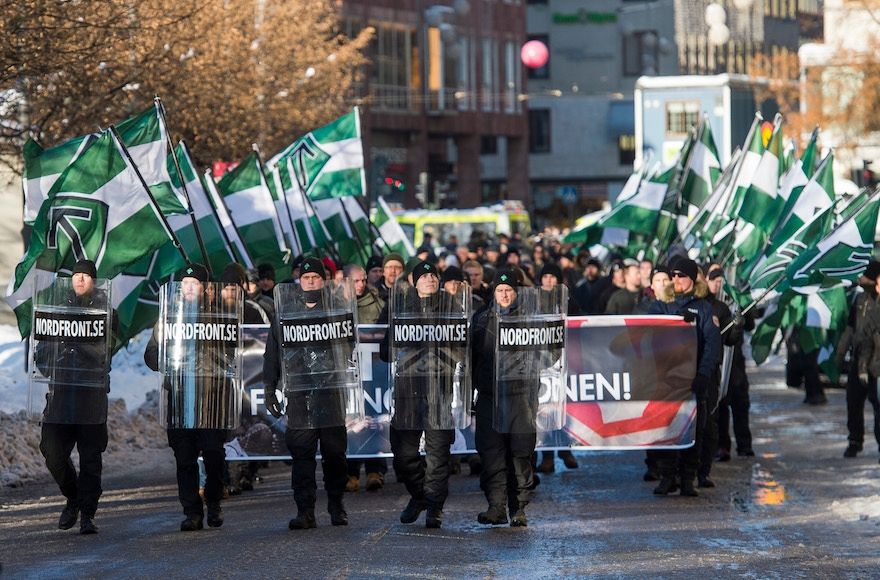Swedish court moves neo-Nazi march on Yom Kippur away from synagogue
Published September 25, 2017

Nordic Resistance Movement sympathizers participating in an anti-immigrant demonstration in central Stockholm, Nov. 12, 2016. (Jonathan Nackstrand/AFP/Getty Images)
(JTA) — A court in Sweden has rerouted a neo-Nazi march on Yom Kippur farther away from a synagogue.
ADVERTISEMENT
The Gothenburg administrative court ruling concerning the Sept. 30 march by the far-right Nordic Resistance Movement overrode the suggested route by police. The court also shortened the route.
The group had initially wanted to march on the main streets of Gothenburg, but the police offered an alternate route taking demonstrators only about 200 yards from the main synagogue in Sweden’s second largest city.
An outraged Jewish community appealed the police decision earlier this month along with several other groups. The Anti-Defamation League and the World Jewish Congress were among others to protest.
Among other factors, the court said it considered the fact that the route would have passed near the synagogue on the Jewish holiday and the demonstration would fall during the Gothenburg Book Fair, when some 100,000 people are expected to gather in the city for the largest literary festival in Scandinavia.
Swedish Jewish leaders cautiously praised the decision.
The Jewish community “welcomes the Gothenburg administrative court’s decision to not allow the neo-Nazi group to march close to Gothenburg’s synagogue on the holiest day of the Jewish year, Yom Kippur,” Aron Verstandig, chairman of The Official Council of Swedish Jewish Communities, said in a statement to JTA.
“Even if the Council had wished that the protest would have been moved to a different day, it views it as a positive development that the court took into consideration that Yom Kippur is celebrated on that day, which the police had not taken into consideration.”
ADVERTISEMENT
The chairman of the Gothenburg Jewish community, Allan Stutzinsky, said the court’s ruling was “a significant improvement,” noting that members could now walk to synagogue without fearing they would encounter neo-Nazis.
“The ruling means that we are much safer,” he told JTA in a statement.
Earlier this month, Stutzinsky said the community, which is typically under tight security, feared harassment and physical threats both from the neo-Nazi marchers and potential left-wing counterprotesters.














